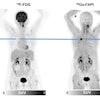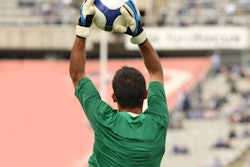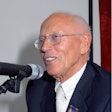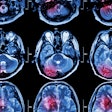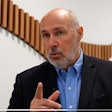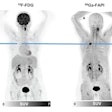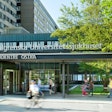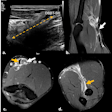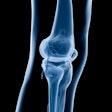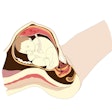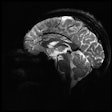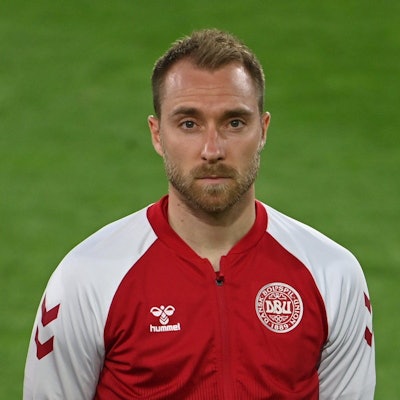
Not all cases of sudden cardiac death can be prevented by screening, and it's vital to balance the risks and benefits, warned cardiac imaging expert Prof. Dr. Stephan Achenbach after the collapse of 29-year-old football player Christian Eriksen on the second day of the Euros.
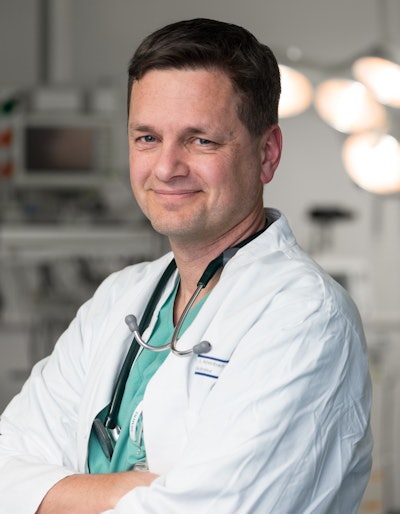 Prof. Dr. Stephan Achenbach. Photo courtesy of Leonard Billecke.
Prof. Dr. Stephan Achenbach. Photo courtesy of Leonard Billecke."Unnecessary downstream testing resulting from too liberal screening may carry risks too," he told AuntMinnieEurope.com on 14 June. "Not all causes of sudden cardiac arrest can be found by screening, but some can. Imaging is important to identify some of them."
If there are abnormal cardiac findings in the workup of athletes (which includes careful history taking), imaging should be used -- echocardiography as the first step and MRI in the case of further doubts, according to Achenbach, who is president of the European Society of Cardiology (ESC).
Diseases to look out for include hypertrophic cardiomyopathy, arrhythmogenic right ventricular dysplasia, myocarditis, and sarcoidosis.
Chilling sight
"It was a chilling sight for anyone who saw it," Achenbach stated in an ESC press release issued on 13 June. "Cardiac arrest can occur anytime, anywhere. The question is: Would you know how to respond? Every second is critical."
Preliminary reports suggest that while he was being treated on the pitch, Eriksen's heart stopped beating, said Achenbach, who is chairman of cardiology and a professor of medicine at the University of Erlangen, Germany.
"He was exceptionally fortunate that there was a medical team to immediately begin chest compressions and maintain blood flow. It probably saved his life," Achenbach said.
Eriksen was taken to Rigshospitalet in Copenhagen. Doctors confirmed on 13 June that he suffered a cardiac arrest and was revived with an electrical shock.
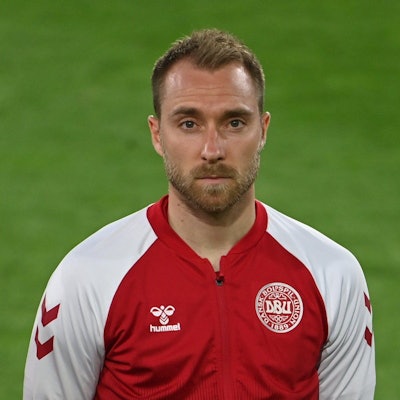 Christian Eriksen's debut for the Denmark national team came in 2010, and he was transferred from Spurs to Inter Milan in January 2020. Courtesy of Federico Gambarini/dpa/Alamy Live News.
Christian Eriksen's debut for the Denmark national team came in 2010, and he was transferred from Spurs to Inter Milan in January 2020. Courtesy of Federico Gambarini/dpa/Alamy Live News.Sudden cardiac arrest is a public health problem, accounting for 50% of cardiovascular deaths and 20% of all natural deaths in Western societies, and it's essential to help when someone is not breathing or only gasping for air, not otherwise moving or blinking, and not responding, even to hard taps, the ESC release stated.
Push down on the center of the chest at a rate of 100 to 120 pushes a minute, the ESC recommends. Allow the chest to come back up to its normal position after each push, shout for someone to call an ambulance, and ask bystanders to locate an automated external defibrillator and follow the instructions.
"You can't do any harm by doing chest compressions," said Achenbach. "But you can save a life if the person is indeed in cardiac arrest."
Sudden cardiac arrest is such a public health threat that the ESC has made it the spotlight of its online scientific conference, ESC Congress 2021, which will be held at the end of August.
Long season for players
Heavy physical exertion plays a major role in football injuries, said Dr. Martin Mack, a specialist in musculoskeletal radiology at Radiology Group Practice Munich, in a Q&A interview posted by the German Roentgen Society (DRG) on 14 June.
"The number of traumatic injuries during the season is higher than in the preseason," he said. "It is also known that the incidence of injuries increases towards the end of both the first and second halves of the season."
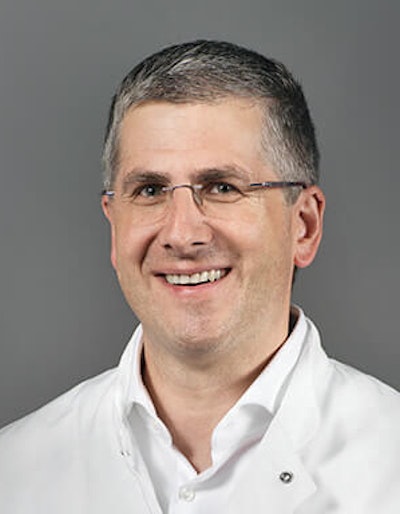 Dr. Martin Mack. Courtesy of DRG, copyright Martin Mack/Andreas Nestl.
Dr. Martin Mack. Courtesy of DRG, copyright Martin Mack/Andreas Nestl.For most players, there was little or no gap between the end of the domestic season and the build-up to the Euros, so regeneration times were very short.
"Football has simply become a very fast sport that is very physical in one-on-one combat and, at least in professional football, it has a high number of games," noted Mack, who is chief radiologist at FC Bayern Munich. "The running speed of soccer players during sprints is around 35 kilometers per hour. All of this taken together brings a degree of injury. However, these are not substantially more common than in other highly professional sports."
Medical check-ups on every newly signed-up player are important for prevention of injuries because they give an overview of questions such as: What potential health problems does the player have? Does the player have minor cartilage damage or meniscus problems? Does he have changes anywhere else on his body, for example in his spine, which could potentially cause him problems in the future?
"What we're not doing is MRI checks on the players every week. We are not that far yet," he continued. "A modern professional sports club, whether in football or in another sport, will not get anywhere without radiology and comprehensive imaging diagnostics, which are used regularly. Minor injuries or overload reactions happen all the time in sport, and you have to watch out for them."
The clinical exam and ultrasound play a role, but ultimately MRI is the method of choice because it is the most precise way to analyze injuries.
"It is becoming increasingly entrenched in the minds of athletes that a well-done MRI is the gold standard," Mack said. "The tendency is for it to be used more and more, which I think makes sense too."
Unsurprisingly, he hopes Germany will win the final of the Euros, to be held in Wembley, London, on 11 July.
"We are well-positioned," Mack said. "Of course, the other teams don't sleep, but the German national team has a good starting point and good players."



